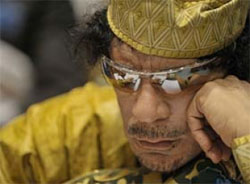| NSPM in English | |||
What Isn't Helping Qadhafi |
 |
 |
 |
| četvrtak, 24. februar 2011. | |
|
(The National Interest, February 24, 2011)
The protestors in Libyan cities so far do not seem to be deterred by anything. In that regard, and notwithstanding Qadhafi’s still for the moment trying to cling to power, it is not too early to draw an important lesson about the policies of outside powers toward troublesome states such as Libya and what effect those policies do or do not have on political change in those states. Among the things that do not seem to be deterring those who are endangering their lives to oppose the regime is the fact that western governments have been doing more or less normal business with the Libyan regime for the last several years, following the U.S.-British-Libyan agreement of 2003. The regime itself doesn’t seem to be drawing any support from that fact; in his defiant and rambling speech on Tuesday, Qadhafi excoriated the United States and Britain along with everyone else he excoriated. He evidently doesn’t think he has a respected-by-the-West card to play. The significance of this fact is that it contradicts much argumentation about policies toward rogue states—argumentation that sees foreign engagement and internally driven political change as mutually contradictory. The notion is that if outside powers do business with a distasteful regime, this somehow helps to inoculate it against whatever rot it may be experiencing within. The further notion is that outside powers must choose between, on one hand, engaging with the distasteful regime and in so doing buying into having it stick around for the long haul and, on the other hand, not engaging and placing one’s hopes entirely on regime change.
When the history of this regime is written, it will show that in the thirty years before there was any rapprochement with the west (the initial secret talks with the United States began in 1999), Qadhafi’s rule was unshaken, notwithstanding the pressures, the ostracism, and even, in 1986, a U.S. military attack. It was only in the few years after rapprochement and engagement were begun that his people revolted. This doesn’t mean the rapprochement made the revolt more likely, but it certainly did not prevent it, and there is no basis for believing it made it less likely. Iran is the subject on which the fallacious reasoning described above is most apparent in policy debates. The issue often gets erroneously framed as a choice between engagement that gives up any hope for regime change, and pressures that are hoped will bring regime change closer. Actually, except for how a policy that is all pressure and hostility is likely to strengthen hardliners in the regime, the conduct of business between the west and Iran is no more likely to determine the future course of internal opposition to the regime in Iran than it did in Libya. Paul R. Pillar is director of graduate studies at Georgetown University's Security Studies Program and a former national intelligence officer for the Near East and South Asia. |
Od istog autora
Ostali članci u rubrici
- Playing With Fire in Ukraine
- Kosovo as a res extra commercium and the alchemy of colonization
- The Balkans XX years after NATO aggression: the case of the Republic of Srpska – past, present and future
- Iz arhive - Remarks Before the Foreign Affairs Committee of the European Parliament
- Dysfunction in the Balkans - Can the Post-Yugoslav Settlement Survive?
- Serbia’s latest would-be savior is a modernizer, a strongman - or both
- Why the Ukraine Crisis Is the West’s Fault
- The Ghosts of World War I Circle over Ukraine
- Nato's action plan in Ukraine is right out of Dr Strangelove
- Why Yanukovych Said No to Europe

.jpg)








 Although the final chapter of Muammar Qadhafi’s regime has not quite been written, in his 41 years in power he has never before faced anything remotely like the current uprising. The uncertainties of what might come after the current regime are at least as great as the corresponding uncertainties in any other Middle Eastern state, given Qadhafi’s long tenure as dictator and the absence of any obvious organization or structure in either politics or civil society that so far can credibly present itself as an alternative. Despite the uncertainties, there are good reasons to wish Qadhafi a speedy departure—not least of all the brutality with which the regime has responded to the recent protests.
Although the final chapter of Muammar Qadhafi’s regime has not quite been written, in his 41 years in power he has never before faced anything remotely like the current uprising. The uncertainties of what might come after the current regime are at least as great as the corresponding uncertainties in any other Middle Eastern state, given Qadhafi’s long tenure as dictator and the absence of any obvious organization or structure in either politics or civil society that so far can credibly present itself as an alternative. Despite the uncertainties, there are good reasons to wish Qadhafi a speedy departure—not least of all the brutality with which the regime has responded to the recent protests. The Libyan case demonstrates that this whole line of reasoning is fallacious. The U.S.-U.K.-Libyan agreement has served for the United States and the west the very useful purposes of cementing Qadhafi’s decision to stop fomenting international terrorism and to start cooperating against it, and to end and to open to western scrutiny the Libyan programs to develop unconventional weapons. Those continue to be useful purposes no what happens to Qadhafi’s regime in the coming days. For Qadhafi, the agreement served to end his international ostracism and thereby to increase his ability to strut again on the world stage. What it did not do was to make him any less vulnerable to the uprising we see today, or to any other form of internal opposition.
The Libyan case demonstrates that this whole line of reasoning is fallacious. The U.S.-U.K.-Libyan agreement has served for the United States and the west the very useful purposes of cementing Qadhafi’s decision to stop fomenting international terrorism and to start cooperating against it, and to end and to open to western scrutiny the Libyan programs to develop unconventional weapons. Those continue to be useful purposes no what happens to Qadhafi’s regime in the coming days. For Qadhafi, the agreement served to end his international ostracism and thereby to increase his ability to strut again on the world stage. What it did not do was to make him any less vulnerable to the uprising we see today, or to any other form of internal opposition.












